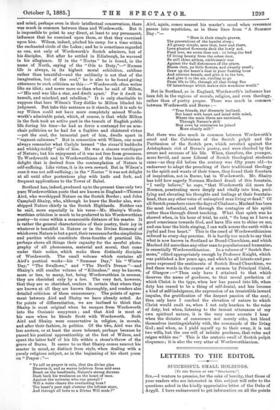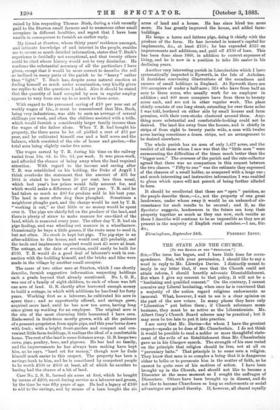LETTERS TO THE EDITOR.
SUCCESSFUL SMALL HOLDINGS.
to ME EDITOR OP TER "SPECTATOR."] SIB.,—I venture to premise, for the sake of brevity, that those of your readers who are interested in this subject will refer to the questions asked in the kindly appreciative letter of the Duke of Argyll. I have endeavoured to get information on all the points
raised by him respecting Thomas Nish, during a visit recently paid to the Sturton small farmers and to numerous other small occupiers in different localities, and regret that I have been unable in consequence to furnish an earlier reply.
My friend at S tartan, whose thirty years' residence amongst, and intimate knowledge of and interest in the people, enables me to secure so much detailed information, states that T. Bush's experience is decidedly not exceptional, and that twenty others could be cited whose history would not be very dissimilar. He confirms the substantial accuracy of all the particulars I have given, except that it would be more correct to describe the soil as inclined in many parts of the parish to be " heavy " rather than "light." T. Bush has, despite some natural emotion at finding himself so much under examination, very kindly given me replies to all the questions I asked. Also it should be stated that the quantity of land occupied by men in regular employ appears to vary from one up to as much as three acres.
With regard to the presumed saving of £10 per year out of weekly wages of 12s., it must be remembered that Mrs. Bash, being very industrious, was able to earn an average of several shillings per week, and often the children assisted with a trifle, which would furnish a considerably larger family income than the wages of the father alone. When T. B. had bought his property, the three acres he let off yielded a rent of £11 per year, and he cultivated himself one and a half acres and the balance, which consisted of the site of house and garden,—the total area being slightly under five acres.
The wages earned by T. B. during his time on the railway - varied from 16s. 6d. to 19s. 61 per week. It was piece-work, and afforded the chance of being away when the land required attention. With regard to the income and saving after T. B. was established on his holding, the Duke of Argyll I think overlooks the statement that the amount of £61 for 1884 is stated to have been 20 per cent. less than usual, which last year's low prices would fully account for, and which would make a difference of £12 per year. T. B. said he had taken as much as 280 for produce sold in his best year. The land is more often du g than ploughed. Sometimes a neighbour ploughs part, and the charge would be met by T. B. "working it out," so that little or no money would be spent over it. The pigs are chiefly fed on the produce of the land, and there is plenty of straw to make manure for one-third of the land, which is mannred every year. The other day T. B. had six pigs feeding, and was wheeling out manure in a wheelbarrow. Occasionally he buys a little guano, if the roots seem to need it, but not often. No stock is kept but pigs. The pig-stye is an after-addition to the house, and would cost £25 probably, and the tools and implements required would cost £5 more at least. The cottage, at the date of erection, could easily be built for 2130. T. B. would do a good deal of labourer's work in con- nection with the building himself, and the bricks and tiles were made in the village by another small occupier.
The cases of two other men at Sturton, which I can shortly describe, furnish suggestive information respecting holdings each a grade beyond that already mentioned. No. 1, G. B., was one of a family of eight children, to each of whom was left one acre of land. G. B. shortly after borrowed enough money to build a cottage, in which with additions he has lived for forty years. Working first as a labourer, he cultivated his acre in spare time ; and as opportunity offered, and savings grew, acquired more land, until he has now ten acres, having long since given up working for an employer. The original acre is the site of the most charming little homestead I have seen. Embowered in fruit-trees mostly grown, with all the patience of a peasant-proprietor, from apple-pips, and this year borne down with fruit; with a bright front-garden and compact and con- venient little farm-buildings, it realises the ideal of a comfortable home. The rest of the land is some distance away. G. B. keeps two cows, pigs, poultry, bees, and pigeons. He has had no family, and the improvements he has always been making have kept him, as he says, "hard set for money," though now he finds himself much easier in this respect. The property has been a savings-bank to him, and he is considered by competent people to be worth £500 or £600 at least, all of which he ascribes to having had the chance of a bit of land.
Case No. 2, S. B., farmed six acres at first, which he bought by means of £200, saved during service as a labourer and groom, by the time be was fifty years of age. He had a legacy of £100 to add to the savings, and by means of a loan bought the six acres of land and a house. He has since hired ten acres more. He has greatly improved the house, and added farm- buildings.
He keeps a horse and fattens pigs, doing it chiefly with the produce of the farm. He has invested in tenant's capital for implements, .Szc., at least £150; he has expended 2125 on improvements and additions, and _paid off £150 of loan. This has been done since 1868, in addition to current expenses of living, and he is now in a position to take life easier in his declining years.
Another very interesting parish in Lincolnshire which I have systematically inspected is Epworth, in the Isle of Axholme. It furnishes convincing illustrations of the soundness and success of small holdings in England. At Epworth there are 300 occupiers of under a half-acre; 324 who have from half an acre to three acres, who usually work for an employer in addition ; and 400 more occupiers have from three to twenty acres each, and are not in other regular work.. The place chiefly consists of one long street, extending for over three miles I was told, bordered on either side by small houses and farm premises, with their corn-stocks clustered around them. Any- thing more substantial and comfortable-looking could not be desired. The land lies away from the houses, and is chiefly in strips of from eight to twenty yards wide, a man with twelve acres having sometimes a dozen strips, not an arrangement to be desired elsewhere.
The whole parish has an area of only 5,477 acres, and the verdict of all those whom I saw was that the "little men" were surmounting the difficulties of the times much better than the "bigger men." The overseer of the parish and the rate-collector agreed that there was no comparison in this respect between the two classes. "Fifty to one" was the estimate they expressed of the chances of a small holder, as compared with a large one ; and much interesting and instructive information I was enabled to glean which space will not permit of being further alluded to here.
It should be recollected that these are " open " parishes, as the people describe them,—i.e., not the property of one great landowner, under whose sway it would be an unheard-of chs- cumstance for such results to be secured ; and if, as the Spectator suggests, landowners in the future can keep their property together as much as they can now, such results as these I describe will continue to be as impossible as they are at present in the majority of English rural parishes.-1 am, Sir, ckc.,
Birmingham, September 24th. FREDERIC IMPEL















































 Previous page
Previous page